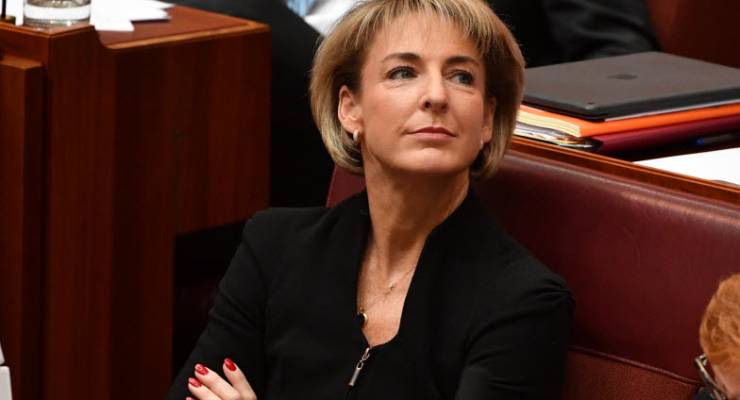
Three of the women sexually harassed by former High Court judge Dyson Heydon have received a historic financial settlement and an apology from Attorney-General Michaelia Cash.
A 2020 independent investigation upheld the allegations of six women that they had been sexually harassed by Heydon while working as associates in the High Court. But how the Morrison government responded to the investigation and the women’s complaints remains unclear. Questioned in Senate estimates, Cash could not say whether the government deliberately delayed negotiations with the three women or why the amount they were paid remains secret.
Heydon has categorically denied the allegations.
Why is the payout secret?
According to an article in The Sydney Morning Herald, the three women — Rachael Patterson Collins, Chelsea Tabart and Alex Eggerking — said the settlement cannot be disclosed under the terms of the agreement with the Commonwealth, although Cash said she could not confirm this.
“I will not be detailing the settlement amount,” Cash told the Senate. “That information will remain between the Commonwealth and the claimants. This has been the commonly accepted approach among governments of both persuasions.”
Labor Senator Murray Watt shot back: “I do think if public funds are being used here, it’s appropriate to ask what the aggregate amount is that the Commonwealth has paid. Why do you think that the public doesn’t have a right to know, in aggregate, how much has been paid to sexual harassment claim against a High Court judge?”
Cash took the question on notice.
Non-disclosure agreements are a common tactic of organisations to protect their reputation — and ultimately protect an abuser, with a victim often quietly moved to a different area of the workforce.
Advocacy groups are pushing for NDAs to be curtailed, and sex discrimination commissioner Kate Jenkins’ Respect@Work report found NDAs could offer anonymity but were often damaging to victims, stopping them from speaking to friends, family and colleagues or helping other survivors.
NDAs also make identifying harassment “hotspots” difficult, so organisations can’t identify trends or solution.
Jenkins wrote to large employers asking them to issue a limited waiver of confidentiality obligations in NDAs so that victims could make a confidential submission to the Respect@Work inquiry, but just 39 organisations agreed.
Did the government delay negotiations?
The report into Heydon was handed down in June 2020 after an investigation across 2019. But the settlement was struck this year, 20 months after the report was made public.
Why the delay? The victims’ lawyer, Josh Bornstein, has criticised the government for prolonging negotiations and delaying resolution, saying the “inaction of Attorney-General Michaelia Cash and Prime Minister Scott Morrison is prolonging their trauma”.
Cash said she hadn’t seen that quote, and could not say if — or how many times — the government had sought to delay proceedings.
“The department became involved in the matters in about October last year and we’ve always acted very quickly … We’ve been very conscious of the need to resolve it as quickly as possible,” she said.
Is this model litigation?
Greens Senator Larissa Waters asked Cash whether her office was a “model litigant” when negotiating with Heydon’s victims.
It’s the responsibility of each agency to ensure it acts honestly and fairly in legal proceedings — but, as estimates revealed, there’s little oversight.
The Attorney-General’s Department has a framework for model litigation but relies on those within the department to report concerns, or other parties in the proceedings to lodge a complaint.
“[The department] has to self-declare that they don’t think they were a very good litigant? That doesn’t seem like a great process,” Waters said.
The three women haven’t raised formal complaints with the proceedings, but the department said it would speak to them to see if they had concerns.








The use of non-disclosure agreements to protect the perpetrators is absolutely scandalous and also totally normal and routine.
It is generally accepted that nobody should be able to get insurance to cover the costs of fines for if they are convicted of criminal behaviour. The reason is obvious. Such insurance would encourage criminality by protecting the guilty from the consequences of their actions. It is blatantly contrary to the public good. Similar reasoning should prevent non-disclosure agreements being used to protect those who engage in unacceptable conduct.
Cash is not bright, like a coal mine at midnight. More brains in a can of Pal…
Why are taxpayers paying Dyson Heydon’s sexual harassment settlements? Surely he should be paying them out of his own pocket.
Confidentiality agreements have become a pox on society. As a lawyer, I concede that in limited circumstances confidentiality can be justified in relation to commercial industrial information and on authentic security and safety matters; ie where information can be commercialised to the detriment of the owner or where personal safety is at risk. But the ubiquity of confidentiality/non-diclosure agreements has become almost comical in the commercial environment to ensure often prosaic and banal ‘secrets’. But where CAs/NDAs are deployed to conceal information that is just plain embarrassing or criminal or unethical conduct, the corrosive effect on society and victims themselves is disgusting.
Correct. If the people must pay, then the people should be entitled to recover the losses from the offender.